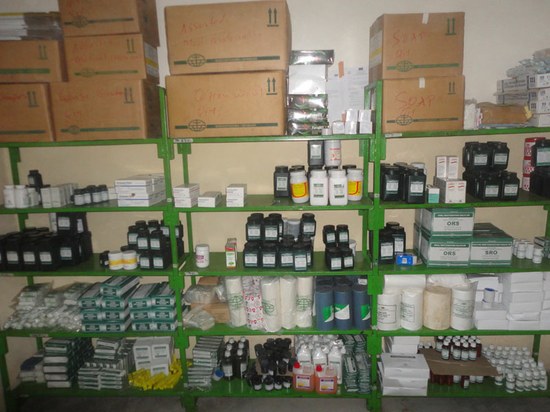 Contribution to MMI Annual Report 2014
Contribution to MMI Annual Report 2014
Lokang Peter Dario is Pharmaceutical Assistant at Omeo Dispensary in Eastern Equatoria, South Sudan. When he was entering the small pharmacy of the health facility he had to pick all the medicines for dispensing from different boxes on the floor. Lokang never received formal pharmaceutical training.
At the time Alex Schei, project manager at Ecumenical Pharmaceutical Network (EPN), first visited Omeo all medicines were stored in carton boxes. There were no boards and no shelves. There were no stock cards or any other system in place for inventory control. Lokang used an exercise book to write down prescriptions and dispensed drugs which already made it hard to determine consumption. This is the situation in almost all health facilities in South Sudan.
Omeo Dispensary is in the South-East of South Sudan and can be reached in 30 minutes from Magwi town during the dry season. South Sudan is Africa’s youngest state currently shattered by violent conflicts between different tribal groups. The health system of South Sudan is very weak and lacks infrastructure, financial resources, medicines and medical equipment and qualified health staff. In the whole country are less than ten trained pharmacists. Most people working in the pharmacies have not undergone any pharmaceutical training.
EPN in cooperation with action medeor initiated a project targeting untrained pharmacy staff in South Sudan. The aim of the project that started in January 2013 was to improve pharmaceutical service quality in 20 selected health facilities in Eastern Equatoria. In order to reach that goal an initial assessment was made and participants for the Essential Pharmacy Practice training were selected.
On 4 March 2013 Lokang and 22 other colleagues from governmental and faith-based health facilities started with the first cycle of the Essential Pharmacy Practice training in Torit, Eastern Equatoria. In the two-week long training Lokang learned about good storing practice, stock management, calculation of consumption and medicine orders. At the end of May the second training cycle focused on dispensing of medicines. Both trainings contained a lot of exercises and field trips to enable participants to put training contents into practice.
One of the main findings of the assessment and a major obstacle for participants to put training contents into practice was the lack of shelves to store medicines. Therefore, 5 health facilities were equipped with shelves and all 20 got stock cards.
When Alex returned to Lokang’s pharmacy for the follow-up visit some weeks later the picture was completely different. All medicines were well-arranged in the shelves. Those with the shortest shelf-live were at the front to be taken next (first-in-first-out). Every medicine had a separate stock card where incomings and outgoings were noted which allowed for determination of consumption.
Training institutions and universities cannot meet the demand for qualified health personnel in many developing countries. Therefore, EPN has developed an Essential of Pharmacy Practice Course for pharmacy staff without pharmaceutical training. In 2012 the full twelve-week long course was attended by South Sudanese pharmacy staff in Uganda. Two modules of the complete course were used for the training in South Sudan in 2013. This year (2014) EPN in collaboration with CHAK, KCCB and action medeor conducts a training of trainers in Northern Kenya. This project includes essential pharmaceutical training and on-the-job trainings for pharmacy staff of 50 health facilities in the region.
Today the charitable, non-governmental organization action medeor e.V. is the largest medical aid organization in Europe. In cooperation with local partners action medeor supplies around 10,000 health centers with medicines and medical equipment. The organization also conducts healthcare projects in Africa and Latin America and works in the areas of emergency relief and pharmaceutical training and technology transfer. action medeor is a member of EPN, a network of mainly faith-based organizations.
The origins of EPN date back to 1981 when the Christian Medical Commission (CMC) of the World Council of Churches (WCC) decided to provide advice and consultation in the area of pharmaceutical services to church health programs, particularly in Africa. EPN is now operating from Nairobi and has 81 members from over 30 countries, mainly from Sub-Saharan Africa.
Contribution to the Annual Report 2013 of the MMI Network
More information: www.epnetwork.org, www.medeor.org
